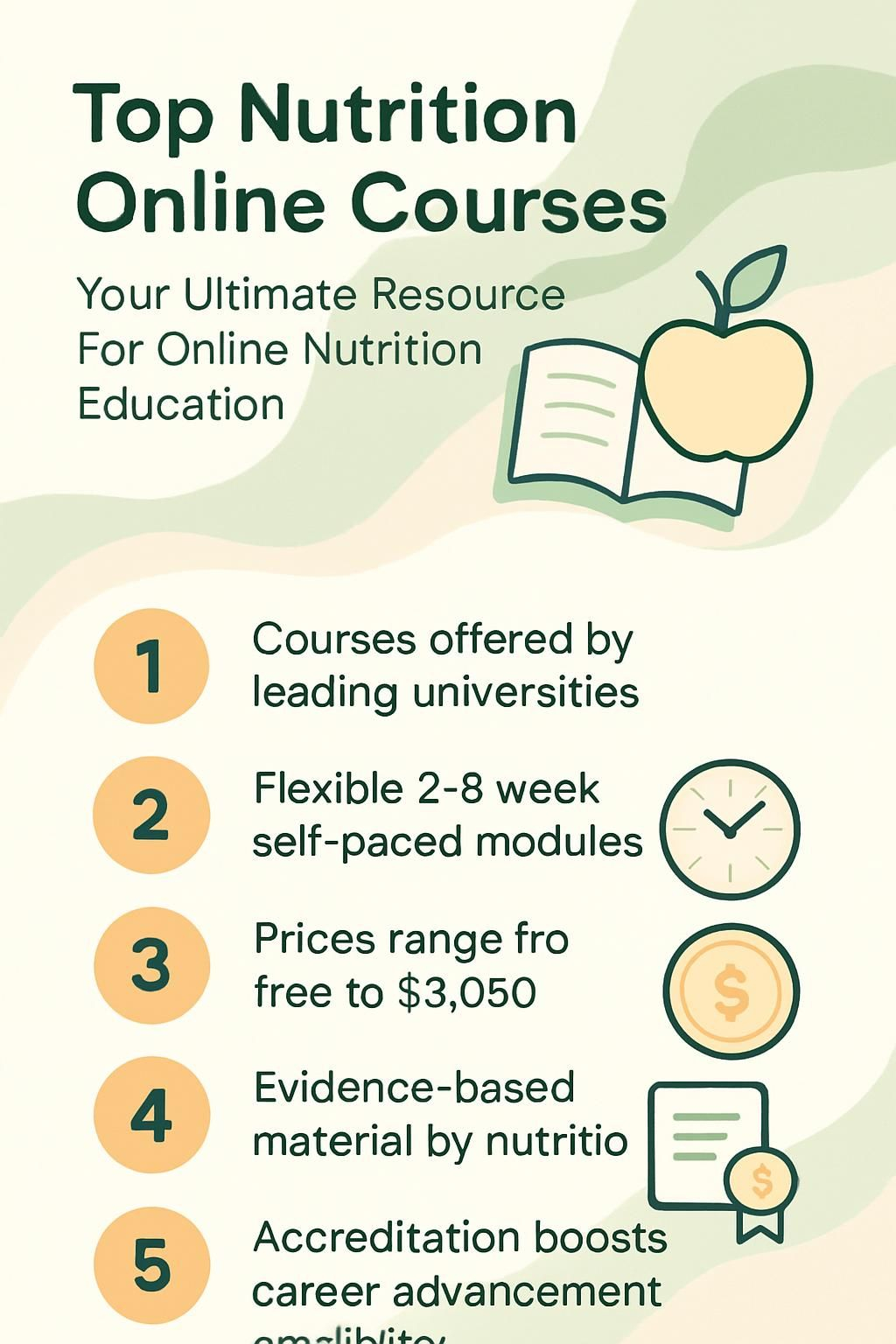Top Nutrition Online Courses: Your Ultimate Resource For Online Nutrition Education
Our Nutrition Assistant AI Suite will transform your body. You will lose fat, get toned, and build muscle. Gain confidence and optimal health.
Picking an online nutrition course can feel tricky. You want skills you can use and science you can trust. The Stanford Center for Health Education offers eight weekly modules that explain macronutrients, micronutrients, and energy balance in clear terms.
This guide gathers top resources so you can compare programs, schedules, instructors, and costs in one place. Follow simple steps to build real knowledge and confidence in food and health.
Key Takeaways
- Top schools, including Stanford, Harvard, Emory, and the University of Copenhagen, teach accredited online nutrition courses, with both free and certificate options.
- Self-paced modules fit busy lives; common formats run 2 to 8 weeks and cover macronutrients, weight control, food safety, and chronic disease prevention.
- Prices vary, from free courses on Coursera, EdX, and FutureLearn to advanced Harvard certificates at $3,050; entry classes can start near $30.
- Courses rely on evidence-based material taught by experts such as Dr. Serena Cardoso and Sally Duplantier, so lessons reflect current research.
- Accreditation from NASM or well-known universities adds credibility for careers in coaching, fitness, or personal wellness.

Benefits of Taking Online Nutrition Courses

Online classes give you access to trusted nutrition education and practical tools. Learn at your pace, from any location, and turn lessons into daily habits.
How flexible and convenient are online nutrition courses?
You can fit learning into mornings, evenings, or weekends. Many programs, including the Stanford University nutrition course, offer eight self-paced modules. Dr. Serena Cardoso finished every unit while running a full-time practice.
Most platforms let you start now or set a later date. Choose fully online, blended, or live virtual formats. No campus ID is needed, and most classes welcome motivated learners who want better health or food safety skills.
“I completed my coursework after work each evening,” says Dr. Cardoso. Flexible tools made steady progress possible while she advanced her career.
Where can I find expert knowledge in online nutrition courses?
The Stanford Center for Health Education features evidence-based nutrition taught by faculty and guest experts. Harvard University and Emory University also provide university-led teaching grounded in current science.
Lessons build critical thinking so you can judge studies, not just headlines. Sally Duplantier notes how Stanford’s courses help separate media claims from tested research.
Programs from groups like the National Academy of Sports Medicine include instructors with clinical and science backgrounds. Case studies show how to apply ideas to obesity, weight management, prevention, and meal planning.
Most courses have no strict prerequisites. That makes solid, accurate information easy to access for learners at many levels.
Are there affordable options for learning nutrition online?
Yes. Coursera and EdX host free classes from schools like Emory, LMU, the University of Copenhagen, and Case Western Reserve University. You can also find budget options at Harvard, such as two-week child nutrition or weight loss courses priced around $30, along with premium programs at higher fees.
Filter by price to see free or paid tracks. NASM offers a free Nutrition Essentials certificate that covers core topics for fitness and general health.
In my own free intro course, simple food safety steps improved my weekly meal prep right away. Small changes added up to better routines in the kitchen.
Common Topics in Online Nutrition Courses
Courses cover how food affects health and daily life. Video lessons, research summaries, and self-care tools help you apply what you learn.
What are the basics of human nutrition?
Most classes start with the building blocks. Macronutrients are carbohydrates, proteins, and fats. Micronutrients are vitamins and minerals. Calorie balance means matching energy in food with energy used by your body. Stanford’s online nutrition course covers these essentials along with official guidelines.
Expect lessons on how nutrients support health and why movement matters. Harvard’s introductions explain evidence-based facts and clear up myths about Diet (nutrition) and weight loss.
Short modules explain how carbs, protein, fats, vitamins, and minerals work in the body. In one self-paced course, I learned how these nutrients affect energy, diabetes risk, and daily choices.
Interactive examples and client stories show the real impact of balanced meals. These basics help you make confident choices for eating and self-care.
How do online courses address weight management and obesity?
Emory University’s “Weight Management: Beyond Balancing Calories” and Case Western Reserve’s “Designing Your Personal Weight Loss Plan” examine what drives weight change. Topics include calorie balance, strength training, and long-term habits that stick.
Harvard’s “Lose Weight and Keep It Off” gives structured help over two weeks at $30. The University of Edinburgh’s free “Understanding Obesity” explains the science of obesity using global case studies.
Many programs teach you to review current research and build your own realistic plan. During a course I took, one small daily swap saved food dollars and raised the nutritional quality of my meals. Progress felt steady and doable.
What do child nutrition and cooking courses cover?
Child nutrition classes show how food supports growth and learning. Stanford’s free “Child Nutrition and Cooking” uses proven guidelines to build healthy habits from toddler years through the school ages.
Teachers walk you through family-friendly cooking with step-by-step videos. You see how real families make better choices with simple meal prep.
Most courses run 2 to 4 weeks, which fits a busy schedule. Caregivers often study together so everyone learns safe, balanced cooking at home.
How is nutrition linked to chronic diseases?
Food choices can lower the risk of chronic diseases like diabetes, obesity, and high cholesterol. Harvard’s “Healthy Eating for Type 2 Diabetes,” a two-week course at $30, explains how foods affect blood sugar and long-term health. The University of Copenhagen offers “Diabetes: The Essential Facts” free online with diet guidance based on research.
Many classes examine how whole grains, fruits, vegetables, and healthy fats support better outcomes. In “Managing Your Cholesterol,” I learned simple menu tips that made daily changes feel easy and clear.
Quick facts for context:
- CDC reports that 6 in 10 U.S. adults live with a chronic disease, such as heart disease or diabetes [1].
- WHO notes that healthy eating patterns help reduce the risk of these conditions over time [2].
Most courses include case studies and critical analysis so you can judge nutrition claims using real data.
What should I know about food safety and sustainability?
Food safety and sustainability are common themes. Stanford’s free “Food Sustainability, Mindful Eating, and Healthy Cooking” shows how smart choices support your health and the planet.
The University of Florida’s “The Meat We Eat” covers safe production and home handling of meat. Harvard connects climate and health in “The Health Effects of Climate Change.” You will also find UC Davis content on food analysis and the University of Copenhagen’s “The New Nordic Diet: From Gastronomy to Health.”
Topics often include environmental impact, ethical sourcing, cutting food waste, and protecting public health with safe storage and cooking.
Popular Nutrition Courses Available Online
Many well-known programs teach practical skills backed by current research. You can study healthy eating, safety, and risk reduction in clear, bite-size lessons.
What is covered in Stanford’s Introduction to Food and Health?
Stanford’s Introduction to Food and Health is a free, self-paced class open to all learners. Across eight weekly modules, you cover dietary guidelines, macro and micronutrients, calorie balance, and everyday healthy eating.
Instructors focus on science, not trends. Guest experts add insights across topics.
Activities build critical thinking so you can evaluate studies on your own. Case studies help you turn lessons into better choices at home and at work.
What will I learn in Child Nutrition and Cooking by Stanford Medicine?
Expect practical steps for feeding children well. Stanford Medicine faculty teach evidence-based modules on nutrition at each stage of childhood.
Case studies show how families improve meals with simple changes. Hands-on lessons walk you through quick, balanced recipes you can cook at home. The course is free and flexible, which helps busy parents and caregivers.
While taking this course, I invited my child to help measure and stir. That small change made cooking fun and boosted our willingness to try new vegetables.
What topics are included in Weight Management: Beyond Balancing Calories?
Emory University’s free course explains the many factors behind weight control. You learn about genetics, metabolism, environment, and mental triggers, not just calories.
Lessons show how to read scientific studies with care. Case scenarios let you test strategies for long-term maintenance.
I used one idea to spot an evening cue that led to snacking. Swapping tea for chips lowered my weekly calories and improved sleep within weeks.
What does Nutrition and Lifestyle in Pregnancy teach?
LMU’s free course covers nutrition during pregnancy using clear, research-based guidance. You learn which nutrients support fetal growth and how the mother’s diet shapes outcomes.
Topics include balanced meals, key micronutrients, and daily habits that reduce risks like gestational diabetes. The class runs 2 to 4 weeks and welcomes learners worldwide.
Modules rely on current studies so you can apply steps right away. Many learners say it helps them plan meals with confidence.
What insights does Understanding Obesity provide?
The University of Edinburgh’s free course explains the causes of obesity from biology to social forces. Case studies add context from different regions.
Teachers review prevention tools and treatment options based on new evidence. In 4 to 8 weeks, you build a clear picture of why rates are rising and what responses can help.
During my run through the course, simple examples made complex ideas easier to use in daily life.
What is The New Nordic Diet: From Gastronomy to Health about?
The University of Copenhagen’s free course explores the New Nordic Diet, linking food culture with health outcomes. You learn core principles that favor local and regional foods.
Topics include sustainability, cultural traditions, and public health case studies on dietary change. In 4 to 8 weeks, you see how this pattern supports long-term wellness and environment-friendly choices.
As I adopted a few lessons at home, I added more seasonal produce and found it easier to plan balanced, simple meals.
Nutrition Certifications and Professional Growth
Certificates help you stand out in health and fitness roles. The right pick can add skills and credibility to your resume.
What does the National Academy of Sports Medicine Nutrition Essentials offer?
NASM’s Nutrition Essentials is a free course built for fitness staff and motivated learners. It covers macronutrients, micronutrients, and how nutrition affects performance.
Each module includes practical strategies backed by research. When you finish, you receive a certificate that supports career growth in gyms or coaching.
As a coach for young athletes, I used the hydration tips during practice and saw more consistent energy across sessions.
What is included in the ASU & Mayo Clinic Health and Wellbeing Certificate?
This certificate highlights nutrition, health, and wellness across life stages. Faculty with clinical and academic experience lead each module.
The program serves people from many fields, not just one job type. Lessons show how smart nutrition supports healthy living, with tools you can use at home and work.
While studying, I tested a simple planning template from the course. It made weekly grocery trips faster and meals more balanced.
What nutrition courses does Harvard provide?
Harvard offers short, self-paced courses such as “6-Week Plan for Healthy Eating,” “Starting to Exercise,” “Healthy Eating for Type 2 Diabetes,” “Lose Weight and Keep It Off,” and “Managing Your Cholesterol.” Each one costs about $30 and lasts two weeks.
Harvard also has a free seven-week class, “The Health Effects of Climate Change.” For advanced study, consider “Health and Wellness: Designing a Sustainable Nutrition Plan,” priced at $3,050, with set registration windows.
All courses focus on evidence-based strategies taught by experts. You gain practical skills in meal planning, weight control, diabetes care, cholesterol management, and sustainable eating.
Leading Platforms for Online Nutrition Education
Large learning platforms host programs from respected universities and professional groups. Filters help you match goals, pace, and budget.
How does Coursera support nutrition learning?
Coursera lists courses from Stanford, Yale, Emory, the University of Copenhagen, and more. You can find free and paid options across Food Sustainability, Mindful Eating, and Healthy Cooking.
Use filters for length, level, language, and price. Choose a certificate track if it fits your goals, or audit for free when available.
Courses start year-round and support flexible pacing. I balanced work and family while studying weight management, then finished on my timeline without stress.
What nutrition courses are on EdX?
EdX hosts classes from Harvard, the University of Florida, the University of Pennsylvania, and other institutions. Harvard’s “The Health Effects of Climate Change” is free and touches food safety and sustainability.
Common topics include maternal nutrition, behavior change, chronic disease, and the basics of human nutrition. Durations range from 2 to over 12 weeks, with certificates available in many courses.
Choose online or live online to match your learning style. Both free and paid paths appear across skill levels.
What can I find on Udemy for nutrition education?
Udemy offers beginner to advanced classes on meal planning, sports nutrition, weight loss, plant-based diets, and food science. Many instructors hold credentials in dietetics or health science.
Short videos and quizzes make concepts easier to grasp. In a beginner course I tried, worksheets helped me organize a balanced weekly menu.
Discounts are frequent, and most courses include lifetime access. Reviews guide you toward classes with strong content and timely updates.
How does FutureLearn offer nutrition courses?
FutureLearn features courses from the University of Edinburgh, LMU, and others. Popular free picks include “Understanding Obesity” and “Nutrition and Lifestyle in Pregnancy.”
Most courses run 2 to 4 weeks or 4 to 8 weeks. Study at your pace, and earn a certificate for your resume when offered.
In a child nutrition class I took, clear video instructions and flexible weekly access made it easy to keep up with lessons.
How to Choose the Best Online Nutrition Course
Start with your goals and schedule. Then check quality markers like accreditation, instructor background, and student feedback.
How do I align courses with my career goals?
Match the course to the role you want. For fitness coaching, NASM’s Nutrition Essentials is a strong fit. For clinical or advanced planning skills, Harvard’s in-depth program may suit you.
Intro classes build core knowledge. Advanced options deepen expertise in diet, long-term disease, or exercise science. Choose the length and intensity that fit your life so you can finish with momentum.
Why is accreditation and certification important?
Accreditation shows that the course content meets recognized standards. Employers notice certificates from respected schools like Harvard, Stanford, and NASM.
Many health and fitness jobs favor certified training. Filter for accredited programs so your learning counts toward your goals.
I chose an accredited certificate two years ago. Hiring managers valued it more than an unrelated degree when I applied for wellness roles.
How can I use reviews and testimonials to decide?
Look for details about teaching quality and practical outcomes. Dr. Serena Cardoso, MD, says Stanford’s Introduction to Food and Health improved both her practice and lifestyle. She recommends it to general practitioners and physicians.
Sally Duplantier praised the course for a strong focus on evidence. Reviews often highlight self-paced learning, flexible schedules, and job-ready skills. Pick programs where graduates say they applied what they learned in real settings.
Advantages of Online Nutrition Education
Study on your terms, then use the lessons right away. The right course makes nutrition science feel clear and usable.
How can online nutrition education boost my career?
Certificates from Stanford, Harvard, or NASM can move your resume to the top. Harvard’s advanced program at $3,050 can open doors to new roles or promotions.
Specialized topics, like weight management or diabetes, expand your toolkit. Flexible study helps you upskill while working full time.
In an accredited weight management class, I learned to apply evidence-based steps with clients. Confidence grew as results improved.
How does it improve personal health knowledge?
Courses explain evidence-based guidelines, macronutrients like protein and carbohydrates, and micronutrients like vitamins and minerals. Many modules teach prevention for diabetes and high cholesterol.
Case studies and cooking demos show how to plan balanced meals for yourself or your family. You also learn to separate hype from facts, which makes shopping and meal prep simpler.
Exposure to sustainable meal patterns provides global context. That helps you adapt healthy habits that fit your budget and culture.
Can it encourage sustainable and healthy habits?
Stanford’s “Food Sustainability, Mindful Eating, and Healthy Cooking” teaches low-waste, seasonal meal planning. The New Nordic Diet course shows how local foods can support health and smaller environmental impacts.
Harvard connects climate effects with personal health. Step-by-step planning helps you build long-lasting routines based on tested habit methods.
Mindful eating and thoughtful shopping guide better choices day after day.
Frequently Asked Questions
You may have a few questions before you enroll. Here are clear answers to common concerns.
Are online nutrition courses accredited?
Many are. Look for accreditation notes on the course page from groups like NASM or schools like Stanford and Harvard. Accreditation supports job requirements and future study.
Free and paid options can include a certificate at completion. Always read the listing to confirm it fits your career needs.
How long do these courses typically take?
Durations range from under one week to more than 12 weeks. Harvard’s featured classes often run two weeks. Another Harvard course on climate health runs seven weeks.
Stanford’s nutrition course uses eight weekly modules. Flexible pacing makes it easier to learn around work and family time.
Can I earn a certification?
Yes. Many programs from Stanford, Harvard, and NASM include a certificate when you complete required work. NASM’s Nutrition Essentials certificate is free.
Certificates vary in level. Some programs stack into specializations or advanced training. Many learners use them to strengthen job applications in health, wellness, or fitness.
Conclusion
Online nutrition courses give you clear steps for better health decisions. Topics range from nutrition basics to advanced certification, so you can choose the depth you need.
Flexible schedules let you study on your time. Expert teachers focus on current research, which helps you turn knowledge into action. Programs from Stanford and Harvard add depth and credibility whether your goal is career growth or personal wellness.
This content is for education. It does not replace medical advice. For personal health concerns, talk with a licensed clinician.References: [1] Centers for Disease Control and Prevention, Chronic Disease Overview. [2] World Health Organization, Healthy Diet guidance. Pricing and dates may change; check each course page for the latest details.
FAQs
1. What are the benefits of enrolling in top nutrition online courses?
Top nutrition online courses provide evidence-based knowledge, practical skills, and updated information on healthy eating patterns. Learners gain access to expert guidance and resources that support personal or professional growth in food science.
2. How do I choose a reliable online nutrition education program?
Select programs accredited by recognized institutions or organizations with strong reputations for quality instruction. Review course content, instructor credentials, student feedback, and available data on graduate outcomes to ensure credibility.
3. Do these courses include scientific research and statistics about diet?
Yes; leading online nutrition education platforms use current studies and nutritional data to teach core concepts. For example, many classes present tables comparing macronutrient values or list recommended daily intakes based on recent guidelines from trusted sources like the Academy of Nutrition and Dietetics.
4. Can I apply what I learn from an online nutrition course in real life?
Absolutely; after taking a reputable class last year, I improved my meal planning using lessons about balanced diets and portion control. Many students report similar results as they integrate new knowledge into their routines at home or work settings.
Summary: Top-rated online nutrition courses offer credible information supported by research findings while equipping learners with actionable skills for everyday health decisions. Choosing an accredited program ensures both reliability and value for your investment in continued learning.







